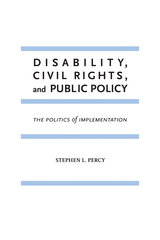


Following on the heels of other Civil Rights movements, disability rights laws emerged in the late 1960s and early 1970s. Often these laws were more symbolic than precise in terms of objectives and strategies to guide the implementation of antidiscrimination policies. Policy refinement, the process of translating legislative mandates into strategies and procedures to govern administrative action, is both dynamic and controversial.
The premise of Disability, Civil Rights, and Public Policy is that implementation policies in these areas evolved through protracted political struggles among a variety of persons and groups affected by disability rights laws. Efforts to influence policies extended far beyond the process of legislative enactment and resulted in struggles that were played out in the courts and in the executive branch. Included within this examination of federal disability rights laws are the role of symbolic politics, the strengths and weaknesses of contemporary models used for the study of policy implementation, and the politics of administrative policymaking.

Giving particular attention to intergovernmental working relationships, this revised edition of Federalism and Environmental Policy has been significantly updated to reflect the changes that have taken place since the highly praised first edition. Denise Scheberle examines reasons why environmental laws seldom work out exactly as planned. Casting federal-state working relationships as "pulling together," "coming apart," or somewhere in-between, she provides dozens of observations from federal and state officials. This study also suggests that implementation of environmental policy is a story of high stakes politics—a story rich with contextual factors and as fascinating as the time the policy was formulated.
As four very different environmental programs unfold—asbestos (updated to include the fallout from the World Trade Center), drinking water, radon, and surface coal mining—Scheberle demonstrates how programs evolve differently, with individual political, economic, logistical, and technical constraints. The policy implementation framework developed for the book provides the lens through which to compare environmental laws.
Federalism and Environmental Policy goes beyond the contents of policy to explore the complex web of federal-state working relationships and their effect on the implementation of policy. It is unique in how it portrays the nuts-and-bolts, the extent to which the state and federal offices work together effectively—or not. Examining working relationships within the context of program implementation and across four different environmental programs offers a unique perspective on why environmental laws sometimes go awry.

The underappreciated but surprisingly successful implementation of the American Recovery and Reinvestment Act (ARRA) helped rescue the economy during the Great Recession and represented one of the most important achievements of the Obama presidency. It tested all levels of government with urgent time frames and extensive accountability requirements. While ARRA passed most tests with comparatively little mismanagement or fraud, negative public and media perceptions of the initiative deprived the president of political credit.
Drawing on more than two hundred interviews and nationwide field research, Governing under Stress examines a range of ARRA stimulus programs to analyze the fraught politics, complex implementation, and impact of the legislation. Essays from public administration scholars use ARRA to study how to implement large federal programs in our modern era of indirect, networked governance. Throughout, the contributors present potent insights into the most pressing challenges facing public policy and management, and they uncover important lessons about policy instruments and networks, the effects of transparency and accountability, and the successes and failures of different types of government intervention.



In addition to the explicit goal of advancing mutual economic interests, regional economic organizations (REOs) are intended to foster regional cohesion and peace. Drawing on a data set detailing the institutional features of 25 REOs established during the 1980s and 1990s, complemented by a case study of ASEAN, Yoram Z. Haftel investigates the factors that affect REOs' ability to mitigate interstate military conflict. He finds fewer interstate conflicts among REO members who have developed high levels of economic integration and who cultivate regular interaction among member-states' representatives. Haftel concludes that, with an appropriate institutional design and fully implemented agreements, an REO can indeed play a role in mitigating interstate conflict and make a meaningful contribution to regional peace.
READERS
Browse our collection.
PUBLISHERS
See BiblioVault's publisher services.
STUDENT SERVICES
Files for college accessibility offices.
UChicago Accessibility Resources
home | accessibility | search | about | contact us
BiblioVault ® 2001 - 2024
The University of Chicago Press









